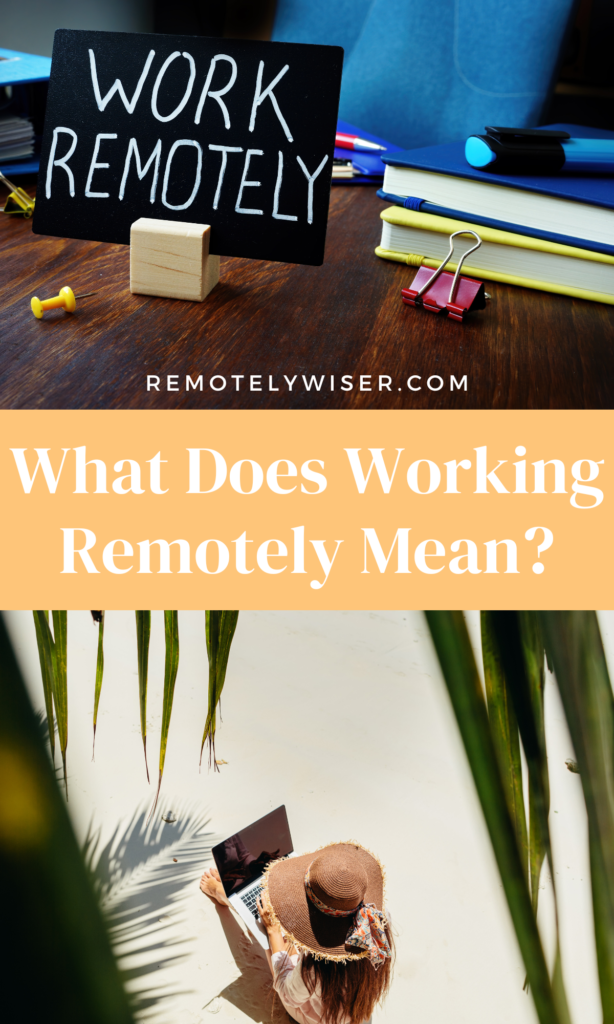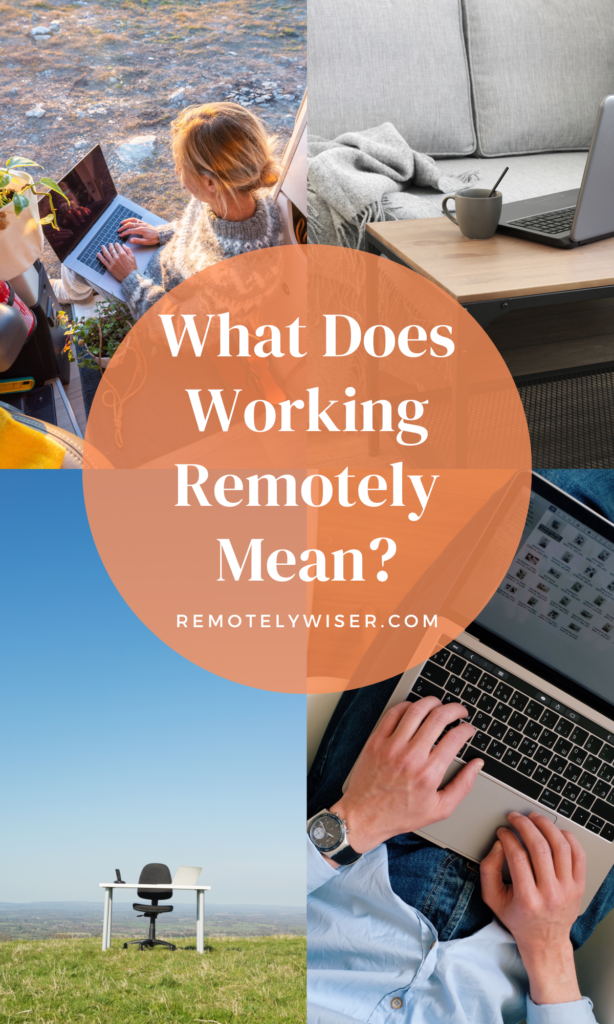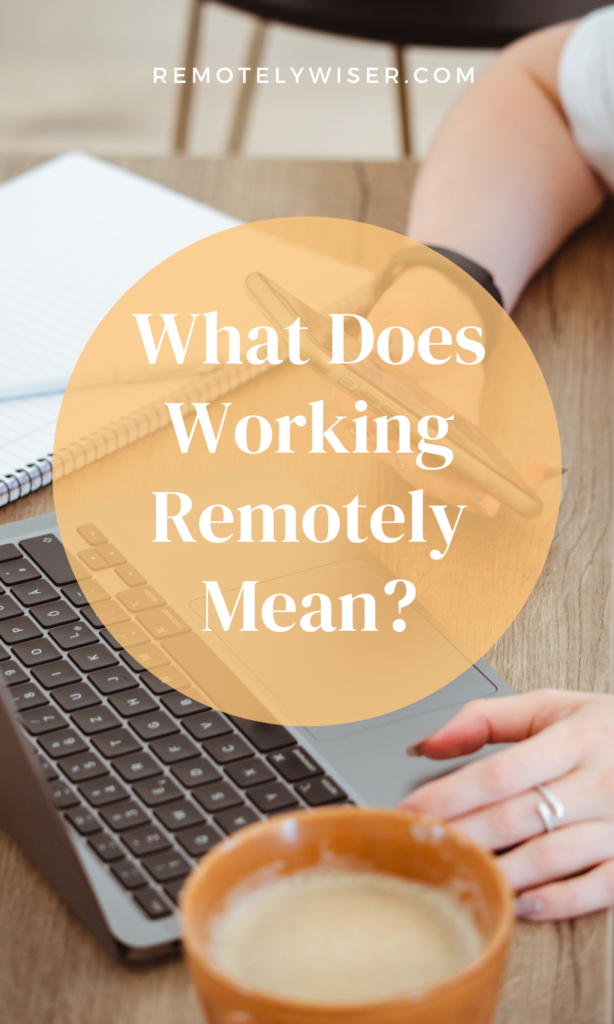So you’ve been hearing talk about working remotely and want to understand what that even means. Well, you’re in the right place!
I’ve been a remote worker and earning money online for years now and I’m excited to share everything I know with you.
If you’re interested in landing your first remote job, check out my other post: How To Land Your First Remote Job
What Does Working Remotely Mean?
Working remotely can mean a few different things. This is a broad term to describe employees who are able to fulfill their work responsibilities outside of the traditional office setting.
Typically, remote workers do this from the comfort of their homes, but have the flexibility to work from co-working spaces, while traveling and really anywhere with a WIFI connection.
Synonyms for Remote Work
There are a few different terms that are thrown around to describe remote work. These include remote work, working from home, telecommuting, and hybrid work.
Remote Work vs. Working From Home vs. Telecommuting vs. Hybrid Work
Remote Work is a broad term that refers to any work that is done outside of a traditional office setting. This encompasses both working from home and telecommuting.
Working From Home (WFH) is exactly what it sounds like, working from the comfort of your own home. It provides the ultimate convenience and flexibility for workers to complete their tasks without a commute.
Telecommuting is another word to describe remote work. It can sometimes be used to broadly describe WFH but also includes alternative locations such as co-working spaces or satellite offices.
Hybrid Work describes employees who split their time between a traditional office and working from home. Typically, hybrid workers will commute into a company office 2-3x a week.
Are Remote Workers And Digital Nomads The Same?
The terms “remote workers” and “digital nomads” are often used interchangeably. Although both can work on laptops from virtually anywhere, they are traditionally different.
Remote workers are usually employed by companies but have the flexibility to work from home. They can be a part of a team across various industries and work a typical 9-5 schedule.
On the other hand, digital nomads are most often self-employed individuals who combine work and travel. Their work often involves freelancing for clients providing various services online. They have the freedom to work from anywhere in the world and often choose to explore different destinations while earning money online.


What Are Some Common Misconceptions About Remote Work?
Remote work has gained significant popularity in recent years, but there are some common misconceptions that need to be debunked.
1. Remote workers are less productive than their office counterparts. Studies have shown that remote workers actually experience higher productivity levels.
2. Remote work leads to a lack of collaboration and teamwork. In reality, remote teams can foster effective collaboration through digital tools like video conferencing and instant messaging. This allows remote workers to communicate as effectively as in-person teams.
3. Remote workers feel disconnected and isolated. However, remote work arrangements often provide flexibility and the opportunity to work from co-working spaces or satellite offices. This helps remote workers maintain social interactions and a sense of belonging within a professional community.
Advantages of Working Remotely
1. Flexible lifestyle
One of the biggest benefits of working remotely is the flexibility that it provides workers. Many workers are able to maintain better work-life balance, thanks to the time and effort they save from not having a commute. I myself find that I’m able to enjoy more quality time with loved ones, pursue my side hobbies, and take better care of my health.
2. Save Money
Say goodbye to the agonizing daily commute to and from work. With remote work, you’ll be able to save money by not spending frequently on gas, car maintenance, or tolls.
Disadvantages of Working Remotely
1. Less Face-to-face Interaction
One of the main drawbacks of working remotely is the lack of face-to-face interaction. If you consider yourself an extrovert and love to interact with people on a daily basis this may be particularly hard on you. You’ll mostly be connected with emails or video chat but it can be limiting in the formation of those relationships.
2. Requires Self Discipline
Being a remote worker requires someone who is extremely self-motivated. With the freedom to work anywhere, comes a responsibility. There will be lots of distractions that can make you less productive.
Believe me, there have been many days where I’ve been tempted to throw on my favorite Netflix show during work hours.
Is Remote Work Right For You?
Before diving into the world of remote work, it’s important to consider a few key factors to determine if it’s the right fit for you. Here are some questions to ask yourself:
1. Are you self-motivated and capable of taking initiative?
2. Do you thrive in a flexible environment?
3. Do you have a high level of self-discipline and the ability to manage your own time effectively?
4. Are you okay working independently for the majority of the day?
5. Do you consider yourself tech-savvy?
If you answered mostly yes to the above, then remote work can be a great fit for you!
Still not sure if remote work is right for you? Check out this post: 10 Things You Need to Know Before Becoming A Remote Worker
Where To Find Remote Work
There are many avenues you can take to locate remote work. One of the best ways and one of my favorite resources is by using job boards.
The Best Remote Job Boards
Looking for the best remote job boards? I’ve got you covered! Below is a list that is a great place to start. Here are my top picks:
1. FlexJobs: FlexJobs is a reputable platform that screens job postings to ensure legitimacy and avoid scams. They offer a wide range of remote job categories, making it super easy to find opportunities that match your skills and interests. However, there is a fee to access their job descriptions, and may not be best for you if you’re tight on money.
2. JustRemote: JustRemote is another popular job board that specializes in remote work opportunities. With a user-friendly interface, they feature a variety of job categories and provide detailed job descriptions to help you land your next perfect role.
3. We Work Remotely: We Work Remotely is one of the largest remote job boards, attracting top remote talent and companies. They offer a wide range of job categories and provide a curated list of remote jobs from around the world.
4. Remote.co: A trusted platform to discover remote jobs from companies across various industries. These include technology, customer service, design, marketing, and more.
5. LinkedIn: If you don’t have a profile on LinkedIn, it’s definitely time that you make one! LinkedIn is a widely popular professional social network and a gold mine to connect with potential employers and recruiters about remote job openings.
Final Words Of Wisdom
When it comes to working remotely, the meaning can take different shapes. If you’re looking to transition into it make sure that you take the time to establish if this is the correct path for your lifestyle. If you’re looking for flexibility and work-life balance but don’t mind working independently and are self-disciplined, this can be an awesome opportunity for you!


